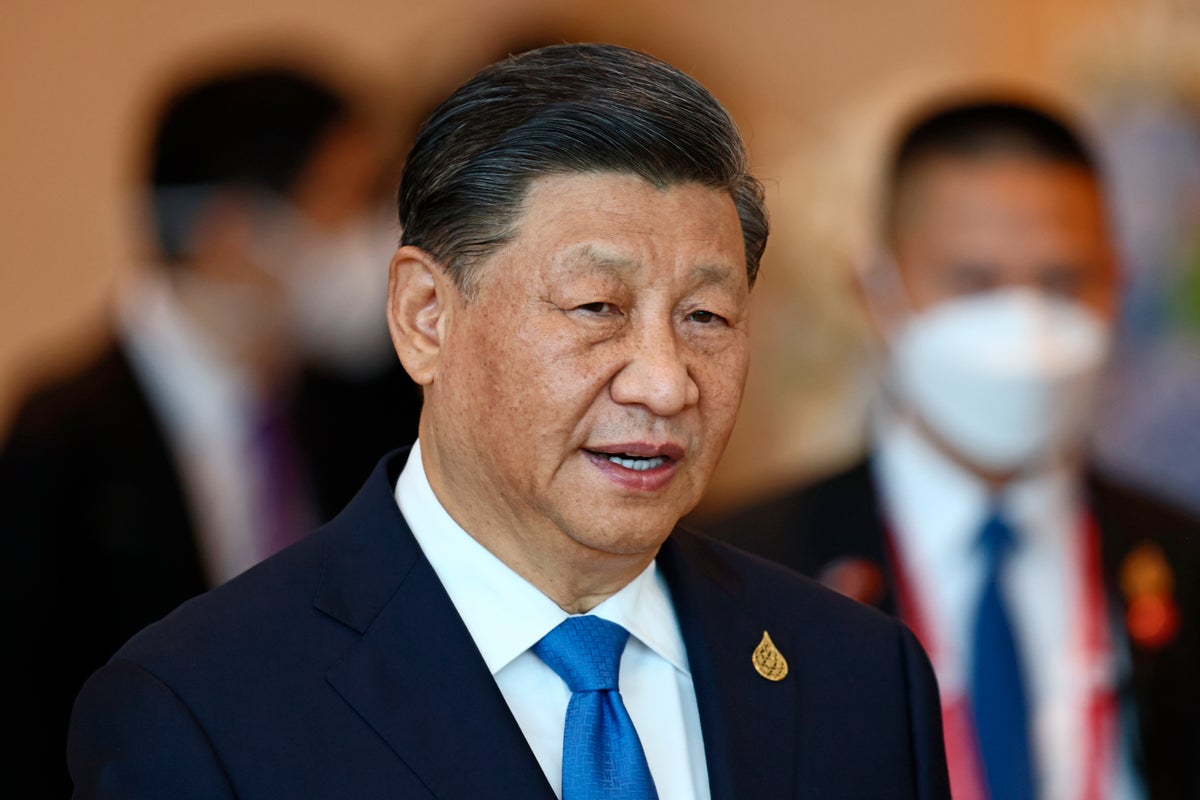
China’s president Xi Jinping has held his first call with Ukraine’s president Volodymyr Zelensky since Russia invaded Ukraine – and has offered to send an envoy to Kyiv and other capitals to hold talks on resolving the war.
Beijing has not condemned the invasion – or shied away from its close ties with Moscow – and Mr Zelensky quickly played up the significance of the “long and meaningful” call, in which Mr Xi is said to have indicted his willingness to help facilitate peace talks aimed at achieving a ceasefire as soon as possible. Kyiv also announced the appointment of a new ambassador to Beijing.
Mr Zelensky tweeted: “I believe that this call, as well as the appointment of Ukraine’s ambassador to China, will give a powerful impetus to the development of our bilateral relations.”
According to a statement issued on Chinese state media following the call, Mr Xi sought to make clear that Beijing is taking a neutral stance over the conflict. “As a permanent member of the UN Security Council and a responsible major country, we will neither sit idly by, nor pour oil on fire, still less seek to profit from it,” President Xi said in what was a possible dig at Western nations that have been very vocal in their support for Kyiv.
“China will send a special representative of the Chinese government on Eurasian affairs to Ukraine and other countries to conduct in-depth communication with all parties on the political settlement of the Ukrainian crisis,” the statement said.
The call was clearly an effort to bolster Beijing’s claim to be a neutral peacemaker, but in reality, Mr Xi has provided plenty of diplomatic cover for Russia’s president, Vladimir Putin, while China remains one of Russia’s most significant trading partners.
Mr Xi and Mr Putin signed a “no limits” partnership agreement weeks before the Russian president ordered the invasion. Since then, China has denounced Western sanctions against Russia. Mr Xi made a state visit to Moscow last month, during which he spoke about the vague 12-point peace proposal Beijing released on the first anniversary of the invasion in February. Earlier this week, European countries were alarmed by comments made by China’s ambassador to France, who said that states like Ukraine, which won independence following the break-up of the Soviet Union, “don’t have actual status in international law”. Beijing later said its position on the independence of ex-Soviet states was unchanged.
The peace proposal put forward by Beijing in February was met with a lukewarm response in both Kyiv and Moscow, although Ukrainian officials have long called on China to use its influence with Russia to help end the war. The US was highly critical of the plan, which suggested that unilateral sanctions be dropped while failing to offer any clear plans for Ukraine’s future security or for the territory seized by Russia.
It is this that will likely prove the biggest sticking point and makes the chance of peace talks look remote, at least at this point in time. Ukraine has been clear that it needs the land that Russia has occupied to be returned, and Mr Zelensky repeated this condition in the hour-long call with Mr Xi.
Saying that he discussed with China’s president ways of “possible cooperation to reach a fair and sustainable peace for Ukraine”, Mr Zelensky was clear that “there can be no peace at the expense of territorial compromises”, adding that “the territorial integrity of Ukraine must be restored within the 1991 borders”. Moscow has repeatedly insisted that Ukraine must recognise its claims to have annexed seized territory.
Following the Xi-Zelensky call, Russia’s foreign ministry spokesperson, Maria Zakharova, said: “We note the readiness of the Chinese side to make efforts to establish a negotiation process.”
The White House welcomed the call, but was cautious about what it will help to achieve. “That’s a good thing,” White House national security spokesperson John Kirby said of the call. “Now, whether that’s going to lead to some sort of meaningful peace movement, or plan, or proposal, I just don’t think we know that right now.”
“We have long said we want this war to end,” Mr Kirby added. “It could end immediately if Putin would leave. That doesn’t appear to be in the offing.”
He continued: “If there’s going to be a negotiated peace, it’s got to be when President Zelensky is ready for it,” stating that the US would welcome “any effort to arrive at a just peace as long as that peace could be ... sustainable, and could be credible”.
The 14-month war is at a juncture, with Ukraine preparing to launch a counteroffensive in the coming weeks or months following a Russian winter offensive that made only incremental advances despite the bloodiest fighting so far in the east of the country.
Later on Wednesday, the top US general in Europe told Congress that Ukraine’s military would get the weaponry it needs in time for the long-expected counteroffensive. “I am very confident that we have delivered the materiel that they need, and we’ll continue a pipeline to sustain their operations as well,” General Christopher Cavoli, the supreme allied commander for Europe, told a hearing of the House armed services committee. Gen Cavoli cited as an example the fact that more than 98 per cent of the combat vehicles promised to Kyiv had already been delivered.
Reuters and Associated Press contributed to this report







